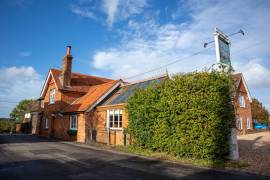Rick Bailey: Maintaining Family Values

To be honest, it already seems out of place in an impoverished pub landscape, and its move is symbolic of a changing industry — and the culmination of an historic period of renewal for the brewer.
It might be summed up as the Yerburghs taking the wheel once more after leaving the driving to professionals from outside the family. And in that the descendants of Daniel Thwaites are lucky to have Rick Bailey.
With a career in the City behind him, most notably on the leisure team at SG Hambros, Bailey is married to Henrietta, one of the four daughters of company chairman Ann Yerburgh.
He was drafted into a full-time role at the brewery in 2009 as director of strategy and development before taking the chief executive’s seat in March this year.
Quietly-spoken and sure-footed, Bailey knows exactly what he’s doing there.
“As a family we have to try and get a better understanding of what’s going on in the business so we can plan for the future. We want to be fully committed, and we want to maintain family values.
“We’ve effectively brought control back into the family. We have a significant involvement now.”
Over the past few years Thwaites has gained a sharper focus on what being a family brewer is about.
“Our evolution has been more a case of what we’re not doing now, than what we’ve done,” explains Bailey. “For instance, we used to do a lot of contract brewing, now we do hardly any.
“We’ve sold pubs, too, from the tail, to get back to a core estate we can invest in, a solid base. The changes have given us a platform to grow the core business.”
Selling the brewery site came as a bit of a surprise, but Bailey makes it sound almost inevitable.
“The current brewery was built in 1966 and needed a big re-investment. The beer market has changed, too, and it’s not as flexible as we’d like it. We need to produce fresh and exciting new beers.
“We had to look at those issues and how we address them, and Sainsbury’s has helped us do that. It’s a good solution.
“It’s an opportunity to create a more efficient operation. The new brewery itself is likely to be slightly smaller, but the rising cost of raw materials means we must make sure we get the most out of them, and we have the chance to configure the plant in the best way possible.
“Our distribution depot, which was built in 1999, is two miles away, so this is an opportunity too to bring everything back onto one site.
“We’ve been in Blackburn for 200 years,” he adds.
“Thwaites is an integral part of the community and we want it to stay that way, so we’re looking for a new site locally. And we want to share it with our customers. We’ll have a visitor centre, brewery tours, we want to make the most of the opportunity to invigorate the business.”
Meeting demand
The new brewery should help the company continue its recent strategy of improving beer quality and broadening its range to meet the demands of a 21st-century beer market.
In addition to its core cask ales, it has produced an impressive 16 seasonal and one-off beers this year, most recently Lancashire Reign, to celebrate Lancashire County Cricket Club’s first league title since 1937.
And over the summer a 20-barrel craft brewery was commissioned to create even more new beers.
Bailey says: “The beer market is moving fast, there’s so much innovation, it’s so competitive.
“We need to up our game to take on the micros and it feels like we’re making progress.”
The brew that’s really caught the drinkers’ imagination, and continues to improve Thwaites’s standing outside its heartlands, is the golden ale Wainwright, named after the legendary rambler Alfred Wainwright.
“It’s great that it is making strides in the on-trade,” says Bailey, with no discernible acknowledgement of the pun.
“People really like it and it’s got further to go. There’s a realness to it, a resonance. It can’t just be about that, though, it’s about getting a great pint, and we need to support quality at the brewery and in the pub.”
A new internal branding initiative called Beer Heroes has the aim of “putting cask ale at the centre of pubs where there’s been a lot of keg sold in the past”, and it’s one example of the increased efforts that Thwaites is making to get the best out of its pubs.
Apart from five, soon to be six, large houses branded Inns of Character, and half a dozen Shire Hotels, all its managed sites have been transferred to tenancy.
A cull at the bottom end has brought numbers down from 440 to 350, and at the same time an increase in investment.
A quarter of the estate has benefited in the past year with projects ranging from £20,000 makeovers to the £650,000 redevelopment of Blackburn’s Oyster & Otter.
Room for expansion
With the company now carrying little debt, Bailey does not rule out expansion, either, and the new WayInn franchise-style (but not a franchise) agreement aims to attract the talent to run them.
It guarantees licensees a £200 weekly income or 15% of the take, whichever is higher, and the brewer takes care of all the costs apart from staff wages.
“WayInn is designed to get the right people into our pubs,” says Bailey. “It’s about sharing the risk in a different way. We’ve done 10 so far and we’ll get to 20. Early impressions are it’s working.”
He appears relaxed about the latest Business, Innovation & Skills Committee (BISC) report on the tie, which recommends a mandatory code of practice and mysteriously fails to note that there’s a difference between the tenant relationship at the big pubcos and what happens at family brewers like Thwaites.
“It’s early days yet, but as far as we’re concerned we’ve looked at the findings and we have some solid responses.
“For me it’s not about having a code, it’s the way you do business. Although we have got a code of practice, of course, and we adhere to it.
“We’ve done a lot to help our tenants through the economic downturn too. We’ve offered discounts on beer and on rent, we’ve introduced flexible agreements, we’ve invested in the pubs.
“We want them to feel a part of the family business and work together with us. That’s what we’re aiming for, and to judge by the tenant surveys we have a good track record.”
Area managers look after between 35 and 40 pubs, giving them time to invest in business planning, and Thwaites received recognition for that last month when Linda Goodfellow reached the final of the Association of Licensed Multiple Retailers’ operations manager awards.
“The recession hit pubs hard up here but we’ve a lot to be proud of,” concludes Bailey.
“There’s no panacea for the problems we face. We’ve just got to make sure our pubs are on their game, that they’re sustainable businesses in their local communities.
“We’re investing in pubs, training people and working hard with tenants to develop their businesses, and these are the ways we can make a difference.
“The family wants to continue a business legacy we can be proud of. We owe that to our people and our customers.”
My kind of pub
“My favourite pub, outside our own estate, is the Fountaine Inn at Linton in Craven, North Yorkshire. It’s near where I live and sits in a beautiful spot in the Dales.
“It’s a good place to take children and it does serve Thwaites’s beer — and great pub food. It’s all the things a pub should be famous for.”
Key dates
1807 Daniel Thwaites becomes a partner in the Eanam Brewery, Blackburn
1897 Thwaites becomes a imited company
1966 Expanded Star Brewery opens
1996 Rick Bailey launches his City career with accountancy giant KPMG
2000 Joins leisure team of banker SG Hambros. Ann Yerburgh becomes Thwaites’s chairman
2001 Marries Henrietta, one of the four Yerburgh daughters
2002 Becomes non-executive director of Thwaites while working for Catalyst Corporate Finance
2009 Joins management team full-time as development and strategy director
2011 Becomes chief executive, replacing Peter Morris. Sale of Star Brewery announced














